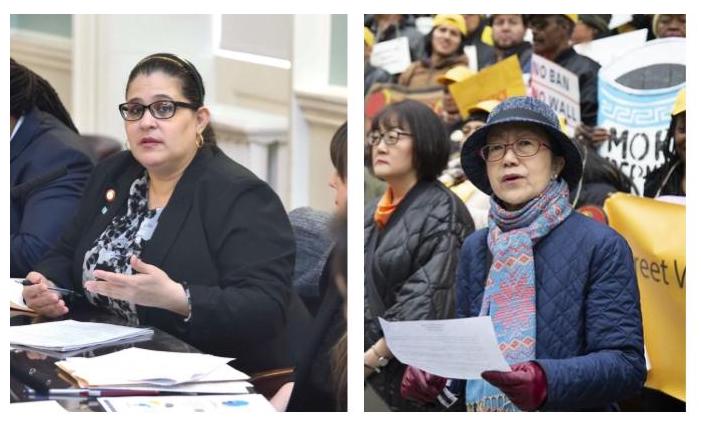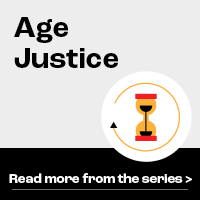A suite of new laws will aim to increase awareness, strengthen enforcement and coordinate services for seniors looking to stay in or rejoin the workforce.

NYC Council
Councilmembers Diana Ayala (l) and Margaret Chin are sponsors of a five-bill package due to become city law.The New York City Council on Thursday is expected to pass a suite of bills targeting ageism, especially in the workforce.
New York’s human rights law has banned discrimination on the basis of age since 1977—and, unlike federal law, prohibits discrimination by age at any age, not just for older people.
In the fiscal year that ended in June, only 1 percent of the cases that came before the New York City Commission on Human Rights (CCHR) involved age discrimination. But the relatively low number of cases might reflect a lack of awareness among older New Yorkers of what ageism is and their rights to combat it.
“Oftentimes people don’t realize this is happening. We want to shine a light on it,” says Councilmember Margaret Chin, a Manhattan Democrat who chairs the Committee on Aging. That means nudging the commission—which also must police discrimination along the lines of race, gender, religion, sexual orientation, disability, immigration status and more—to raise the profile of its work against age discrimination. “We really wanted to make sure that it’s a priority,” Chin says. “It doesn’t seem like they see it as that important,” she added, although that could reflect public perception rather than the commission’s priorities.
Chin is the prime sponsor of three of the bills that will come before the Council this week. Diana Ayala, a Democrat who represents a Manhattan-Bronx district, authored the author two.
Ayala’s bills include Intro 1684, which requires CCHR to create a poster on age discrimination and post it in gathering places in city offices. The second bill, Intro 1685, compels each city agency* to provide training on age discrimination to all city agencies every two years. That’s an amended approach: Ayala’s original bill sought annual training.
One of Chin’s bills (Intro 1694) would create an office for older workforce development to centralize and coordinate the city’s existing workforce resources for older people, and to try to get city agencies to be more inclusive of older workers.
Right now, Chin says, those services are not centralized. “There’s no focus on the older worker. They may need some specialized training. How do we get them skills? Seniors have a lot to contribute.”
Another of the bills (Intro 1693) makes combating age discrimination an explicit focus of an existing advisory board within the Department for the Aging (DFTA).
When the package of bills came under consideration last fall, the measure that prompted the most tension between Chin and the de Blasio administration was Intro 1695, which originally would have compelled CCHR to send at least 15 pairs of “testers” to root out age discrimination by local employers and unions over a three-year period.
As City Limits reported last fall, the administration resisted that mandate, arguing that testing is not an effective tool for exposing the often subtle presence of age discrimination.
The final bill does not require use of testers. Instead, over a two-year period beginning after Mayor Bill de Blasio leaves office, “the commission on human rights shall design, prepare and utilize a variety of methods to address age discrimination in the workplace,” the legislation reads. “These methods shall be used, at a minimum, to assess workplace and employment practices, and technologies and policies that promote or involve age discrimination.”
“We gave them a little bit more time to do a two-year study and that would include all the tools that they have, and it would include testing,” Chin says.
CCHR tells City Limits that age discrimination is “an important area of enforcement,” and points to legal guidance—some of it specific to issues related to COVID-19—it published this summer, the 114 age-discrimination cases it has filed over the past two years and the outreach work it has done with community groups and advocates.
“New Yorkers are protected from age discrimination under one of the most robust human rights laws in the country, the New York City Human Rights Law,” Carmelyn Malalis, the CCHR chair and commissioner, says. “We encourage anyone who has faced discrimination on the basis of age, or any other protected class, to report it to the NYC Commission on Human Rights.”
According to the federal Equal Employment Opportunity Commission, surveys indicate that as many as 60 percent of workers aged 45 or older have experienced or witnessed age discrimination.
“The existence of age-discrimination in the workplace is a serious injustice that harms the workplace of the talents, expertise, and dedication that older adults can bring to an organization,” says Katelyn Andrews, director of public policy at LiveOn NY, an advocacy group for senior citizens. “It further deprives older adults of the opportunity to continue to find purpose and economic stability in their later years by continuing to contribute to society through gainful employment. We applaud Council Member Chin and Council Member Ayala for their legislative efforts to address and shed light on this critical issue.”
Especially important, Chin says, is for the city to look at its own house. “We’ve got to start with our own city agencies. Age discrimination is also happening in city agencies,” she says.
Within city departments, ageism can be masked by fiscal considerations: In schools, for instance, principals who must manage a finite budget might eschew hiring older, more experienced teachers because of their higher salaries. Ageism can also intertwine with gender discrimination, as alleged by some of the former high-ranking female NYPD officers who have sued the department.
Among the biggest obstacles to combating ageism is the misconception that it only affects people who would call themselves senior citizens. The mid-career news anchors who have sued NY1 for age discrimination indicate that is not always the case. “We’re not talking about people in their 60s, 70s, or 80s,” Chin says. “People in their 40s are being discriminated against.”
In a statement, a spokesperson for DFTA told City Limits the agency planned a stronger focus on the issue.
“Older workers have a lot to contribute to our workforce – expertise, dedication, and know-how. Unfortunately, ageism is so pervasive in our culture that workplaces often fail to see discrimination in the workplace,” the statement read. “We continue to work with external stakeholders, elected officials, and fellow city agencies on helping employers recognize age discrimination. In the coming year, DFTA will launch an anti-ageism campaign, focused on ending the ageist attitudes that are prevalent in our culture.”
*Correction: The original version of his article erroneously reported that DFTA would be responsible for the training at each agency. In fact, each agency will do its own.










4 thoughts on “City Council Gearing Up to Combat Age Discrimination”
“Older workers” is a misnomer in the Age of Longevity. It confuses people, making them believe that the discrimination occurs against people over 65, or maybe over 80. NO. Discrimination begins at 40, 45, 50.
This is a systemic problem, which has worsened over the past forty years. Getting rid of workers assures that wages stay low. Younger workers are cheaper and don’t know the successful history of collective action that unions made possible.
What is the answer?
One answer is calling them “midlife workers.”
I felt I was being discriminated against as early as 35. If you are someone who reaches that age who has not become a senior level manager, your chances of getting hired are almost zero.
The New York Public Library and other city agencies are almost the worst places to apply even if the people who are already there may skew older. They seem to want people who will be there for 20 years before they become eligible for pension. This is often an excuse to recruit “young blood.”
A recruiter at the NYPL (a young girl) told me “It’s going to take more than a year to fill this job! Are you still willing to wait for it?” I know she said this to get rid of me, because public libraries don’t conduct years-long searches like academic libraries. I complained about this and someone actually called me back. I am sure she just said this to get me to withdraw my application because she thought I was too old to start working there at age 58 and that is what I told the HR manager.
I said I don’t care if my complaining makes me look bad because I am done applying for city jobs. They clearly want newbies.
If the city council is truly interested in combating age discrimination in city government agencies, the personnel files of city workers who were terminated should be examined to determine if most of them were older workers near retirement. Possible cost saving measures by getting them off the payroll.